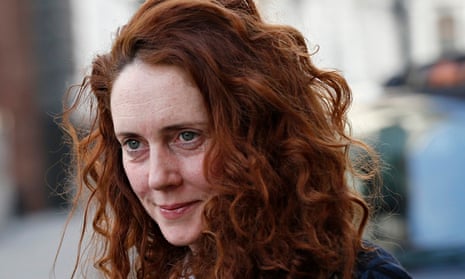Sun journalists rarely questioned the sources of stories for fear of a dressing-down from the “dragon” editor Rebekah Brooks, a court has heard.
Chris Pharo, 45, the paper’s head of news, said he did not ask where stories had come from because he was too junior to “police” the newsroom. And he claimed no one at the paper would dare challenge a cash payment system personally managed by Brooks.
Pharo, who worked under Brooks – then called Rebekah Wade – for six years between 2003 and 2009, said his job was to assess the value of stories rather than to find out if information had been obtained through corruption.
He told Kingston crown court his approach was: “Ask no questions, get no answers”.
Prosecutor Peter Wright QC asked: “Did anyone ever question anything at the Sun?”
Pharo replied: “I have to say, very little.”
Wright asked: “So you all walked round in fear of another tirade from that dragon, Rebekah Wade?”
Pharo said: “That’s a pretty accurate summary.”
Wright continued: “During which you would be cowed into what you believed was necessary.”
Pharo is accused of paying two police officers, a prison guard, and a Broadmoor healthcare assistant for stories between 2002 and 2011.
He is in the dock with the Sun’s former managing editor Graham Dudman, 51; former deputy news editor Ben O’Driscoll, 38; reporter Jamie Pyatt, 51, former reporter John Troup, 49; and picture editor John Edwards. All face corruption charges.
Pharo told the court he adopted the “line of least resistance” with cash payments to avoid blazing rows with his reporters, and said Brooks was in charge of the payment authorisation. “It wasn’t my job to ask about the sources of journalists at the Sun”, he said. “It wasn’t my job to police the Sun newspaper.
“It was a cash payment system that was approved by the editor, that the editor wanted, that the company wanted, with an advert on page two of the paper. It was way above my pay grade to get involved in where cash payments were going.”
Jurors have seen a series of emails between Pharo and Pyatt, allegedly showing the news editor approved payments to police officers.
“Is it you turned a blind eye to any prospect of this being a public officer?” asked Wright, referring to a leak of information that singer Dane Bowers had been arrested for drink-driving outside glamour model Katie Price’s house.
Pyatt told Pharo that the “tipster” had given him “every cough and spit from arrest” and the information had been “screened away on the computer”.
“I admit it was not front and centre in my mind”, said Pharo, of the possibility the source was a police officer.
Wright countered: “You didn’t ask because you knew all along. Ask no questions, get not answers – is that it?
Pharo replied: “That’s exactly it.”
Pharo said he “very rarely” turned down requests for payments from Pyatt and other Sun journalists.
Judge Richard Marks QC asked: “Are we to understand you never refused a request from Jamie Pyatt or any other journalist for a cash payment?”
Pharo answered: “Very rarely – rarely would I turn them down”, adding it could be every one request in 100.
Wright asked: “You’ve managed to acquire the position with the Sun newspaper and within News International as the head of news by adopting the line of least resistance?”
Pharo replied: “In terms of the cash payments system, it was often the only option. It’s a system I inherited, and I decided to do my best to work it. £500 seems a [lot] of money, but we are talking about a budget worth millions.”
He said Pyatt habitually “bigged-up” his contacts, and any challenge over the source would lead to an argument.
Wright said: “Did you routinely allow journalists to walk over you by caving in to their demands?
Pharo replied: “In these circumstances, yes.”
Wright accused him of talking “rubbish”, arguing: “What was going on during your time was the routine corruption of public officers by the payment of moneys for them to divulge information.
Pharo replied: “I would disagree with that.”
He conceded his played an “integral part of the process of valuing” stories for cash payments.
In an email on 15 March 2006 about the murder of a teacher, Pyatt told Pharo and Edwards he wanted to pay a police officer “who tipped us off to the school teacher stabbed to death with a pair of shears by his son’s best friend”.
Pharo told the court: “This was another one of the emails from Jamie that generally would just be an annoyance and I would just want off my screen.”
Pharo, of Wapping, east London, denies four counts of conspiracy to commit misconduct in public office.
O’Driscoll, of Windsor, Berkshire, and Dudman, of Brentwood, Essex, both deny three counts of conspiracy to commit misconduct in public office.
Edwards, of Hutton, Brentwood, Essex, and Pyatt, of Windsor, deny two counts of conspiracy to commit misconduct in public office.
Troup, of Saffron Walden, Essex, denies one charge of misconduct in public office. All six defendants have been cleared of an overarching conspiracy to pay public officials, while Pharo was found not guilty of paying a Sandhurst soldier.
The trial continues.
